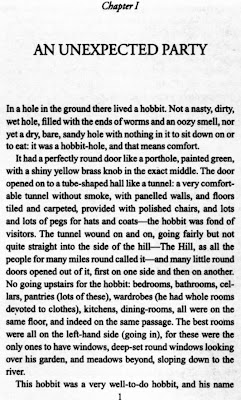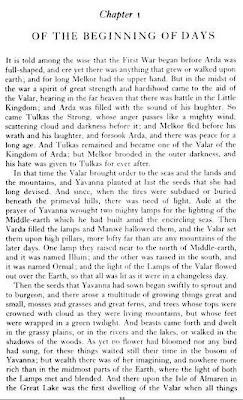The abundance of internal evidence about the Book of Mormon's status as an authentic ancient document was an important starting place for the conversion of at least one non-LDS scholar. Maybe it's something you should keep in mind as you read the document for yourself.
Evening Update: I see we have someone raising the old canard about Tolkien's writings having just as much of a "historical" sense as the Book of Mormon - an argument that I think can be most sincerely offered by critics who have read neither Tolkien nor the Book of Mormon. Look, you don't have to accept the Book of Mormon and you're free to dismiss it as fiction. But for those who are interested in understanding its nature, I would ask this in response: Can anyone seriously fail to grasp the world of difference in these books, and genuinely think that they are somehow cut from the same literary cloth, or that a reference to them could possibly be relevant in a discussion of the Book of Mormon? If Joseph had instead written The Hobbit or The Silmarillion, with all their fascinating detail (and even with the epic language in The Silmarillion and the occasional "and it came to pass") would anyone fail to recognize right away that it was obviously a modern novel written with modern literary devices and conventions, no matter how old the story purports to be, and no matter how skillful Tolkien was in creating his own fictional world? Intricate and fascinating, but a modern creation of enjoyable fiction, not anything close to what could be seriously imagined as a historical document - much less a sacred historical document.
The entire nature of the Book of Mormon, with its complex but carefully described historical origins, its detailed and complex authorship, its varying styles and tones, its shifting but logically organized timelines reflecting different original texts edited together into a rich composite, is so unlike the typical literature in Joseph Smith's day. The critics would have us believe he was a sponge who soaked up and spilled out the material of his day. This doesn't come close to explaining the Book of Mormon, other than a small fraction of direct quotes from the Bible used by Book of Mormon authors. And it doesn't come close to explaining the internal evidences that this book is an authentic ancient document, not a modern novel written as if it were ancient.
For those unfamiliar with Tolkien, here two beginning pages from the beginnings of The Hobbit and The Silmarillion (first page of the "Quenta Silmarillion" section - it's what was easily pulled off of Google Books). Click to enlarge and read. Compare that with the matter-of-fact nature of a historical document that sets forth who is speaking, when, etc., and its concern about preserving information, etc., such as we find, for example, at the beginning of the Book of Mormon (see below) - not to mention the insistence on multiple eye-witnesses to substantiate its reality. For my professor guest, the strong historical flavor of the Book of Mormon, so unlike the fictional writings of the nineteenth century, convinced her that she was dealing with an authentic historical document that demanded attention, not immediate dismissal. This allowed her to open her mind and read sincerely - the last thing some of our critics want any of you to do.


Beginning of the Book of Mormon:
THE FIRST BOOK OF NEPHI, HIS REIGN AND MINISTRYRight from page 1, we have the first author in the book of Mormon explaining who he is, who his parents are, when and where he lived, how he is preparing the text, and what the political situation is as the story begins. It's not the voice of an omniscient narrator or an entertaining novelist. It's the voice a Jewish man, Nephi the son of Lehi and Sariah, in Jerusalem in 600 B.C., writing a sacred historical record with his own hand. And we have this kind of flavor throughout the text - without a trace of the romanticism of Joseph's era or any of the conventions of the modern novel.
An account of Lehi and his wife Sariah and his four sons, being called, (beginning at the eldest) Laman, Lemuel, Sam, and Nephi. The Lord warns Lehi to depart out of the land of Jerusalem, because he prophesieth unto the people concerning their iniquity and they seek to destroy his life. He taketh three days' journey into the wilderness with his family. Nephi taketh his brethren and returneth to the land of Jerusalem after the record of the Jews. The account of their sufferings. They take the daughters of Ishmael to wife. They take their families and depart into the wilderness. Their sufferings and afflictions in the wilderness. The course of their travels. They come to the large waters. Nephi's brethren rebel against him. He confoundeth them, and buildeth a ship. They call the name of the place Bountiful. They cross the large waters into the promised land, and so forth. This is according to the account of Nephi; or in other words, I, Nephi, wrote this record.
1 Nephi 1
[1] I, Nephi, having been born of goodly parents, therefore I was taught somewhat in all the learning of my father; and having seen many afflictions in the course of my days, nevertheless, having been highly favored of the Lord in all my days; yea, having had a great knowledge of the goodness and the mysteries of God, therefore I make a record of my proceedings in my days.
[2] Yea, I make a record in the language of my father, which consists of the learning of the Jews and the language of the Egyptians.
[3] And I know that the record which I make is true; and I make it with mine own hand; and I make it according to my knowledge.
[4] For it came to pass in the commencement of the first year of the reign of Zedekiah, king of Judah, (my father, Lehi, having dwelt at Jerusalem in all his days); and in that same year there came many prophets, prophesying unto the people that they must repent, or the great city Jerusalem must be destroyed.
Read it, ponder it, take it seriously for at least a moment or two, and find out for yourself.
Continue reading at the original source →



